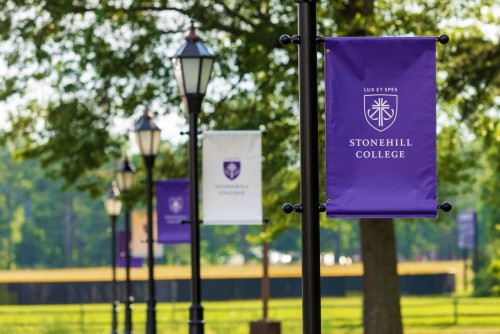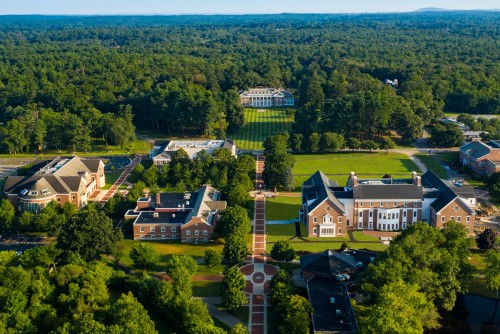Exploring Race and Racial Solidarity Through K-Pop
Student researchers investigate the international popularity of South Korean pop culture in the context of racial solidarity.
Professor Jungyun Gill has fond memories of listening to Seo Taeji and Boys, a Korean boyband, while attending college in Seoul in the 1990s. The group, whose music combines elements of hip hop and heavy metal, rose to popularity during a time of transition for South Korea. The people of the region were beginning to break free of the limits imposed on them by the country’s dictatorship.
“It was a creative period of cultural exploration,” said Gill, who is chair of Stonehill’s Sociology Department. “We had a civilian president for the first time, elected by popular vote. People embraced freedom from tradition and ideologies.”
This newfound liberty gave way to a golden age of music, television and film. Eventually, this content was exported across the globe, leaving a massive cultural footprint in its wake. Korean media remains popular worldwide today, as exemplified by the acclaim of musical groups like BTS and Netflix series such as Squid Game.
Jungyun Gill, professor of sociology, sociology department chair
Mining Sociological Data from the Korean Wave
Gill spent much of summer 2022 working with SURE scholars Gianna Barboza ’23 of Taunton, Massachusetts, and Sadé Ratliff ’23 of Randolph, Massachusetts, to investigate the so-called Korean Wave, a term denoting the international popularity of South Korean popular culture.
“Gianna is an incredibly motivated person, and I think enthusiasm, willpower and initiative are very important when doing a SURE project,” Gill said. “And Sadé is someone who really benefits from the kind of learning environment SURE offers, as she is a really creative person. Working with the two of them has been fantastic.”
The research team specifically examined the ways in which Korean pop music (K-pop) and television dramas (K-drama) might impact people’s views on topics such as race and social activism. They interviewed fans of K-pop and K-drama across four racial/ethnic categories (Black, Latinx, Asian and White).
“We’ve reached out to people we know are interested in this media utilizing the snowball sampling method—we ask our interviewees if they know anyone else who might be interested in participating because they like Korean music or TV,” Barboza said.
As part of their community research, Barboza and Ratliff conducted interviews throughout the region, including a nearby barber shop.
Exploring Connections to Other Social Justice Movements
The conversations that the team has had with their subjects have enabled the researchers to assess whether fans of Korean media are more likely to support the #StopAAPIHate campaign. They have also examined whether fans have a favorable view of the Black Lives Matter movement, as K-pop borrows from Black culture.
Barboza, a sociology and criminology double major with a minor in anthropology, is credited with setting this project in motion, as she was the one who approached Gill about a possible collaboration. She had not consumed much Korean media prior to SURE but has since become hooked.
“I really enjoy K-dramas like Juvenile Justice,” Barboza said. “They’re so dramatic. There are all these people fighting and it’s just very addictive. Despite some differences, they’re a lot like the things our culture likes to watch.”
Ratliff, who created her own Black Studies major through Stonehill’s Interdisciplinary Studies program, notes the gravity of this content and her team’s work is not lost on her or her collaborators.
“This is a fun project and it’s nice to have conversations about lighthearted TV shows, but at the core of this research, we’re helping give people of color the agency to understand themselves and how they function in society,” she said.
Ratliff appreciates that her SURE research has allowed her to work with a group made up entirely of women of color.
“Building solidarity with one another through our common experiences has been enriching,” she said. “This team and this space we’ve created are very powerful. This experience has been an invaluable learning opportunity.”
Close student-faculty bonds are a common element of SURE. Above, Gianna Barboza ’23, left, and Sadé Ratliff ’23, right, share a moment with Professor Jungyun Gill.
-
Request Information
Sign up now to be added to our mailing list, and we will show you how Stonehill could become part of your story.
-
Visit Opportunities
Our visit programs will help give you a better understanding of how Stonehill’s expansive leadership and experiential learning opportunities equip students for success in a rapidly evolving and globally competitive world.
-
Apply for Admission
Stonehill College provides an exceptional learning experience for both undergraduate and graduate students. We invite you to review the process, requirements and application deadlines for our entry options.


